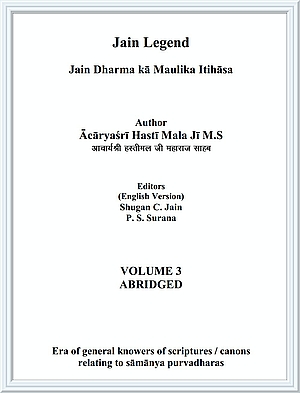Ācārya Akalaṃka was a great scholar and influential ācārya of Digambara sect. His time has been estimated by scholars as 720-780AD (V.N. 1247-1307 or Vikram 777-837). He composed a number of religious texts, some of which are listed below:
- Tattvārthavārtika Sabhāṣya
- Aṣṭaśatī (Vṛtti of Āpta Mīmāṃsā by Samanta Bhadra)
- Lāghava Stara Savṛttī
- Nyāya Viniścaya Savṛttī
- Siddhi Viniścaya
- PramāṇaMimāṃsā
- Prameya Mimāṃsā
- Naya Mimāṃsā
- Nikśepa Mimāṃsā
- Pramāṇa Saṃgraha
His father's name was Puruṣottama who was the minister of the Rāṣṭrakūṭa dynasty King ŚubhaTuṃga of Mānyakheṭa. Nikalaṃka was his younger brother. Both brothers had sharp intellect. Both brothers Alongwith their parents took the vow of celibacy from Ācārya Ravi Gupta.
Akalaṃka had such a sharp intellect that he could retain even the toughest lesson once heard in his memory and he could recite the same. The same lesson had to be repeated twice to Nikalaṃka. Endowed with such sharp intellect, both the brothers acquired deep knowledge of all scriptures and skills and became experts in the same.
In those days Buddhist logic was very popular all over the place. So both brothers became extremely inquisitive to learn the same. So they went to a Buddhist monastery to learn the same. They hid their religion and got admitted to the school for learning Buddhist logic. Then they started diligently studying and learning Buddhist scriptures. In a very short time both brothers acquired expert knowledge in Buddhist scriptures.
One day when their teacher was teaching them the lesson to refute Anekānta doctrine of Jainism, then he could not remember some of the parts of Anekānta doctrine. Hence he stopped further discussions on the same for the next day. Both the brothers rectified the lesson on refutation of Anekānta doctrine by Ācārya Dig Nāga of Buddhism. When the teacher saw the rectified pages of the lesson in the classroom, he was astonished to see the correct version. He became confident that some Jain scholar in disguise has entered and admitted in the school. He therefore decided to find out the true Jain scholars amongst his students.
Like Buddhist ācārya found the brothers Haṃsa and Paramahaṃsa, disciples of Ācārya Hari Bhadra, similarly the Buddhist ācārya found out the truth about Akalaṃka and Nikalaṃka. He sent them both to the confinement room of the monastery.
Study of Akalaṃka and Nikalaṃka in disguise in the Buddhist monastery, capture of Nikalaṃka and the washer man by Buddhist soldiers, escape of Akalaṃka from this troublesome event, six months scriptural debates of Akalaṃka with Buddhist Ācārya and subsequent defeat of Buddhist ācārya in the same and victory of Akalaṃka are all similar to the story of Haṃsa and Paramahaṃsa, the two disciples of Ācārya Hari Bhadra.
There had been many scholars with Akalaṃka as their name. Their chronological names are given below.
- Akalaṃka Paṇḍita 1098 AD.
- Akalaṃka Traividha died in 1163 AD
- Akalaṃka Candra 1200 AD
- Akalaṃka Deva died in 1256AD
- Akalaṃka Muni Nandi congregation Balātkāra gaṇa and disciple of Ācārya Jaya Kīrṭi
- Akalaṃka Deva Mūlasaṃgha 1550-1575AD
- Bhaṭṭāraka Akalaṃka Deva composer of Śabdānuśāsana in Karnataka 1586-1615AD
- Akalaṃka Muni Bhaṭṭāraka of Deśī Gaṇa Pustaka gaccha Kārkala maṭha.
- Akalaṃka Deva composer of unavailable Pratiṣṭhākalpa
- Akalaṃka, composer of Paramāgama Sāgara in Kannada. Time unknown
- Akalaṃka Composer of Caityavandana, Pratikramaṇasūtra, Monk Śrāvaka Pratikramaṇa and Pada Paryāya Maṃjarī. Time unknown.
Main composers of religious texts during 34th and 35th pontiffs of Lord Mahāvīra
Jina Dāsagaṇi Mahattara: The name of Jina Dāsagaṇi Mahattara as a composer of cūrṇis in Jain literature stands out as their foremost composer. He wrote extremely important texts like Nandicūrṇi, Niśīthacūrṇi and Āvaśyakacūrṇi. He completed Nandicūrṇi in V.N. 1203 (Śaka 598 or Vikram 733).
Cūrṇis composed by him were not important from historical viewpoint but were extremely helpful for monks, serious practitioners to enhance their knowledge of scriptures.
 Acharya Hasti Mala
Acharya Hasti Mala
